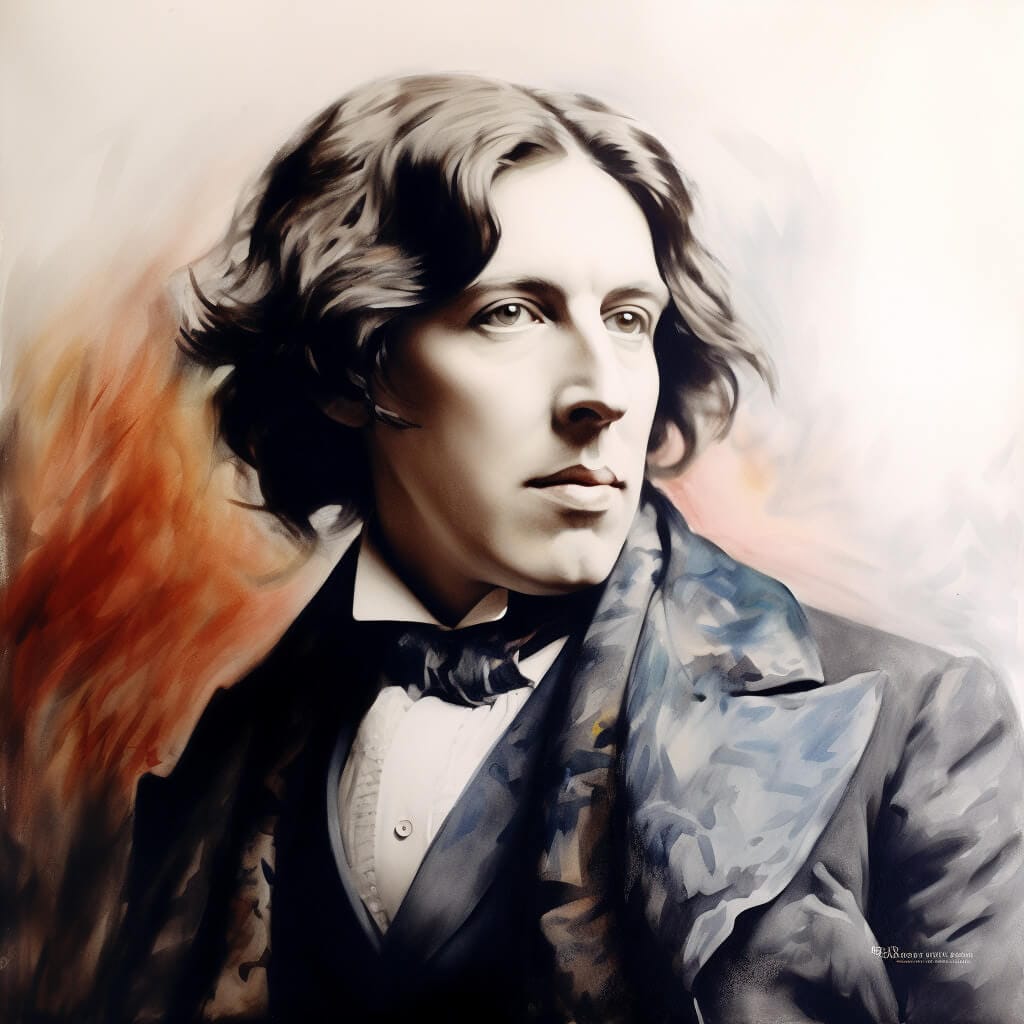Oscar Wilde is remembered today as the author of The Picture of Dorian Gray and many other works, mostly plays, which were crafted to challenge and entertain. The Anglo-Irish playwright, poet, and critic has become one of the most well-known British poets of all time. He was, in his time, the leader of the aesthetic movement.
Wilde was known for many things, but he became particularly famous for his society comedies, such as Woman of No Importance, from 1893, and His life came to a deeply sad end when he was convicted and suffered imprisonment for a relationship he maintained with Sir Alfred Douglas, better known as Bosie.
Life Facts
- Oscar Wilde was born Oscar Fingal O’Flahertie Wills Wilde in Dublin, Ireland, in October of 1854.
- He attended Trinity College in Dublin and, while there, received the Foundation Scholarship.
- In 1881 he published his first collection, Poems.
- Wilde toured America, giving a total of 140 lectures in nine months.
- Oscar Wilde established himself as a leader of the aesthetic movement.
Interesting Facts
- Wilde was a lover of John Keats’ poetry.
- He met with a number of notable literary figures in America while traveling, including Oliver Wendell Holmes and Walt Whitman.
- He published The Happy Prince and Other Tales and The Picture of Dorian Gray in 1888.
- In 1895 he was convicted of “gross indecency.”
- He died in 1900 of an ear infection that had been contracted and untreated in prison.
Famous Poems
- ‘The Ballad of Reading Gaol’ is most certainly Wilde’s most famous poem. It is long and considered to be his last great work before his death. Throughout the winding and hauntingly rhythmic stanzas, Wild describes the life and death of a prisoner who “killed the one he loved.” This character, based around a real man (Charles Thomas Wooldridge), is hanged while the other men watch.
- ‘Apologia’ is, as many of Oscar Wilde’s poems are, based around love. The poem contains statements directed at the speaker’s lover. He tells this person of all the things he’d do for them. This includes selling his ambition and giving himself over to sorrow. He would do whatever it takes.
- ‘Magdalen Walks’ is based on Wilde’s memories of his university days. The poem depicts spring and the beauty of its arrival against the backdrop of Magdalen College, Oxford, where Wilde when to school. The elements of spring work wonders on the land, improving it in every way.
- ‘Requiescat’ takes its name from something that is spoken to the dead. This makes a great deal of sense when one starts reading the poem, and they come to understand that the speaker believes he can talk to his lover after they are gone. He expresses his fear that any heavy walking or loud talking near her gravesite is going to disturb her slumber. He eventually concedes that this is not the case; she can hear nothing.
- ‘Her Voice’ is the companion piece of another popular poem by Oscar Wilde called ‘My Voice.’ It is the longer of the two and speaks about a symbolic garden, eternity, and the consolation she takes in the fact that she still has her beauty and he, his “Art,” when they part.
Early Life
Wilde was born Oscar Fingal O’Flahertie Wills Wilde in Dublin, Ireland, in October of 1854. He was born to Sir William Wilde and Wilde’s mother, Jane Francesca Elgee, who was a poet that became closely linked to the Young Irelander Rebellion of 1848. Wilde’s father was a celebrated doctor who worked as the medical advisor for the Irish census. William was elite in his field and was knighted for his work.
As a young child, Wilde attended Portora Royal School in Enniskillen, where he was first introduced to Greek and Roman studies, a passion that would stay with him his entire life. He was a bright child and often won awards.
After graduating, Wilde attended Trinity College in Dublin and, while there, received the Foundation Scholarship, the highest award given to undergraduate students. He would continue to receive awards during his schooling and upon his graduation. One of which, the Demyship Scholarship, allowed him to study at Magdalen College in Oxford. Towards the end of his time at Magdalen College, Wilde published his long poem, ‘Ravenna,’ which won him the Newdigate Prize in 1878.
Literary Career
After graduating from Magdalen, Wilde moved permanently to London. In 1881 he published his first collection, Poems. The next year Wilde toured America, giving a total of 140 lectures in nine months. He met with a number of notable literary figures while traveling, including Oliver Wendell Holmes and Walt Whitman.
After returning home, he continued to lecture, traveling through England and Ireland until 1884. It was during this time that Wilde established himself as a leader of the “aesthetic movement,” or the idea that one should live by a set of beliefs advocating beauty as having its own worth rather than as a tool of promotion for other viewpoints.
Writing Career and Relationships
Oscar Wilde married Constance Lloyd, with whom he would have two sons. In 1888 Wilde entered his most creative and productive years. He published The Happy Prince and Other Tales, as well as his only novel, The Picture of Dorian Gray. At the time of its publication, critics and readers were outraged by its content and apparent homosexual undertones. While his novel was not received well, he was enjoying success with several plays, such as An Ideal Husband and The Importance of Being Earnest.
During this same time period, Wilde was deeply involved in an affair with Lord Alfred Douglas, more commonly known as Bosie. Douglas’s father, the Marquess of Queensberry, was outraged by the affair and wrote a note to Wilde addressed, “Oscar Wilde: Posing Somdomite” (an accidental misspelling of “sodomite”). Wilde’s choice to sue Bosie’s father for libel ruined his life.
Prison and Death
Wilde’s private life began to fall apart in the early 1890s despite one of his greatest works being published. Wilde’s comic masterpieces Lady Windermere’s Fan and The Importance of Being Earnest, which were released in 1892 and 1895, respectively. In 1895, after a trial and conviction for “gross indecency,” Wilde spent two years in prison under forced labor conditions. This sentence took a great toll on the writer and in 1897, after being released, Wilde moved to London. His last great work, ‘The Ballad of Reading Gaol‘ was completed in 1898. Oscar Wilde died on November 30, 1900, of acute meningitis that was triggered by an ear infection that had been contracted and left untreated while in prison in Paris, France.
Influence from other Poets
Oscar Wilde was notably influenced by writers such as John Keats, the works of Walt Whitman, and William Shakespeare. He himself alluded to his admiration for French poets Théophile Gautier and Charles Baudelaire.
FAQs
Oscar Wilde is renowned for his iconic works, such as The Picture of Dorian Gray, which was published in 1891. Some of his other famous works include Lady Windermere’s Fan and The Importance of Being Earnest, which were published in 1892 and 1895, respectively.
Oscar Wilde’s life came to a tragic end in Paris in 1900 when he succumbed to meningitis that came from an untreated ear infection while in prison. He was detained after being involved with Lord Alfred Douglas romantically. Douglas’ father took badly to the relationship and began to cause turbulence in Wilde’s life.
Oscar Wilde had a significant impact on society in a number of ways. His works challenged the conventions of Victorian society, and his work helped to promote the idea of aestheticism. He was also a vocal advocate for gay rights, and his imprisonment for homosexuality in Paris in 1900 helped to raise awareness of the issue.
Throughout his life, Oscar Wilde lived in many locations, including Dublin, London, Paris, Oxford, and the United States. Wilde would spend the majority of his time in London and Paris.
Oscar Wilde’s poems were full of irony, wit, humor, and a belief in Aestheticism. He believed that art should be for art’s sake and that beauty was the highest form of truth.


